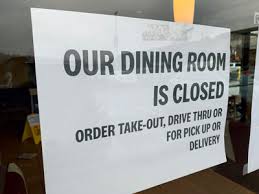Is there something to learn from other industries
 There is no doubt that the Covid-19 pandemic has greatly influenced and impacted the death care industry over the past two years. In general, there has been more deaths and less public services of such deaths. One might argue, especially in larger markets, that the increased number of deaths has more than made up in revenue for the loss of revenue suffered because of the lack of services caused by social distancing rules. At least that’s what appears to be the case to me as I study the financials of the public companies in our profession.
There is no doubt that the Covid-19 pandemic has greatly influenced and impacted the death care industry over the past two years. In general, there has been more deaths and less public services of such deaths. One might argue, especially in larger markets, that the increased number of deaths has more than made up in revenue for the loss of revenue suffered because of the lack of services caused by social distancing rules. At least that’s what appears to be the case to me as I study the financials of the public companies in our profession.
And, there has been other changes, not necessarily financial in the death care world. . . .for instance, the increased use of technology. However, while the death care profession has had some changes, it can also be argued that no industry has been impacted more than the restaurant industry as this article indicates. In many states, indoor dining was closed down for a period of time and restaurants had to re-invent themselves to be profitable under a circumstance where dining was only take-out or delivery. It’s an industry where tens of thousands of businesses have gone out of business and the employment in the sector is still down over one million people than at pre-pandemic numbers.
My wife, Angie, and I have had the habit of going out for dinner every Friday evening for over twenty years. When restaurants in our community were ordered closed in March, April, and May of 2020 that stopped being the case. Now, our Friday night continues to be a pizza ordered in and a movie or other television event. We are just one of millions of couples that changed our habits that are slowly coming back. . . we went out to an Italian restaurant last Friday evening.
The attached article relates that we aren’t the only ones. — Our demographic, the Baby Boomers, has seen zero increase in dining out over the past two years, while those older than us have shown a 12% decline in restaurant visits for the same period. My question when seeing that number is “Will the lack of desire to go out by the older sect, be translated into also having a lack of desire for public death care services as well?”
I don’t know the answer for that, but that older group seems to be more cautious of being around crowds because of the potential transmission of the covid virus. If they have that thought — will they pass on the chance to have services for their loved ones going forward even as the virus seems to wane? If they do, funeral homes will continue to see that service revenue loss, and as we all hope the virus wanes, those lose of services will not be made up for with increased deaths as has happened to date. What, then, are some options in combating that potential loss of revenue.

Tom Anderson
Funeral Director Daily
What we are seeing now in the restaurant and grocery industries is a drop in the options available to the consumer to help with labor costs. Restaurants are now specializing in what they are best at and leaving ancillary items off the menu simply because they can save labor on the chef of the ancillary items that are not their big income producers. And, companies like PepsiCo have temporarily stopped production of some of their less profitable brands to concentrate their manufacturing and transportation assets on the items that have the most profitability.
Is that possible in the death care business? I’ve always commented that I see the death care business eventually becoming a somewhat niche business. . . maybe you will offer direct cremations only or maybe you will off only alkaline hydrolysis to client families. We already have a company, Recompose, that, to my knowledge, only offers recomposition as a method of human disposition as their business plan.
I find it interesting to contemplate but difficult to implement labor savings for full- service funeral homes. Even if you are doing only 30% traditional, embalmed burial services, you need to have somebody on staff to do that embalming and work with the deceased. Or do you? What about a service contract with a trade business to handle those cases for you? I have noticed what seems to be a great increase in trade and removal services over the past couple of years. . . .especially for night calls. My guess is the use of such by traditional funeral homes lowers margins but keeps current funeral directors much happier. . . .and in this environment of staff shortages, is probably a good move by funeral home owners.
This is another one of those articles with no answers but a lot to contemplate. For instance, if you streamline the services that you offer, can there be corresponding savings that are greater than the revenue you are apt to lose? That is something that these restaurants are experimenting with to find out. . . .For instance, some of my favorite QSR (quick service) restaurants have shortened their hours of operation to save labor costs. They will lose revenue, by being closed those hours, but will find out if the labor savings more than makes up for that lost revenue.
Funeral service is labor intensive. If you can figure something out to save labor costs it should drift all the way down to the bottom line. Being creative in this realm, if done right, may be able to make significant differences in your operation.
More news from the world of Death Care:
- Culpepper funeral director, lacrosse coach battling cancer, gives to fieldhouse project. Culpepper Star Exponent (VA)
- “Unique” cemetery opens in Lake Elmo following long legal fight. Yahoo News
- Ancient Roman town, cemetery discovered by British rail company. Jerusalem Post
- Set for demolition, Mitchell and Fair Funeral Home was fixture in West End community. Salisbury Post (NC)
Enter your e-mail below to join the 2,551 others who receive Funeral Director Daily articles daily:




















